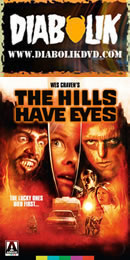
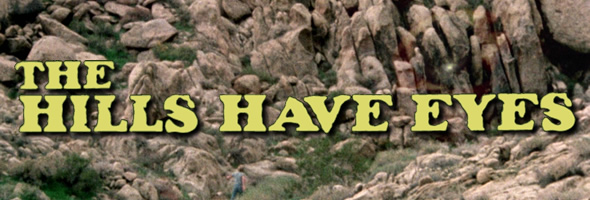
Color, 1977, 89m.
Directed by Wes Craven
Starring John Steadman, Janus Blythe, Peter Locke, Russ Grieve, Robert Houston, Michael Berryman, James Whitworth, Lance Gordon, Virginia Vincent, Suzie Lanier, Dee Wallace, Brenda Marinoff, Cordy Clark
Arrow Video (UHD & Blu-ray) (US/UK R0/A/B 4K/HD), Image (Blu-ray & DVD) (US RA/R1 HD/NTSC), Anchor Bay (DVD) (US R1 NTSC/UK R2 PAL) / WS (1.78:1) (16:9)

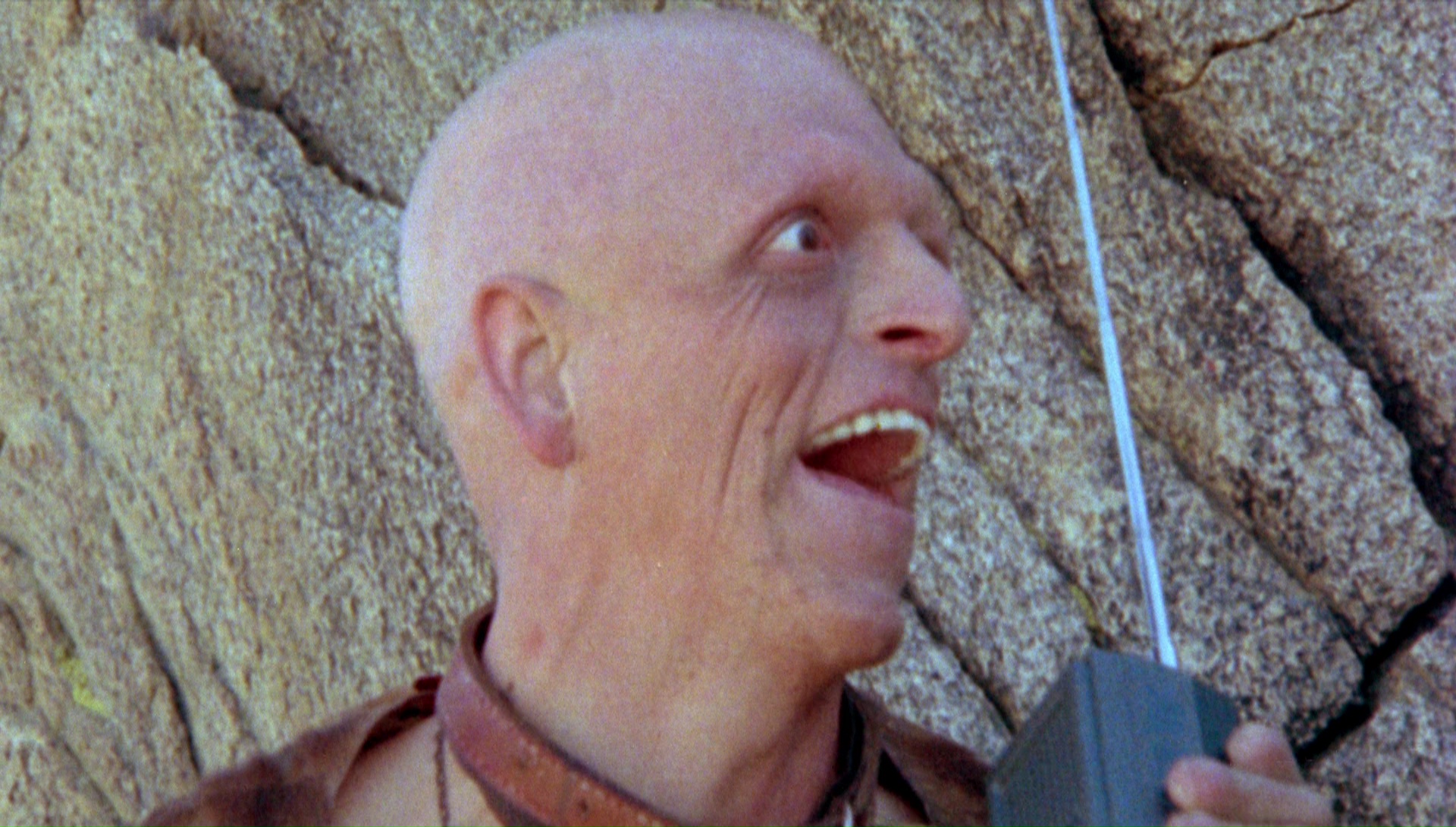 After creating a notorious cinematic calling card with his debut feature, Last House on the Left, Wes Craven took five years to unleash a second horror film: The Hills Have Eyes. Though relatively savage and violent enough at the time to earn an X rating, the film was obviously geared to a more traditional drive-in audience with its thrills tied to an outlandish clan of inbred desert dwellers named after figures from Roman mythology instead of the all-too-real sexual predators and sadists from his first film. Now considered a classic of ‘70s horror, The Hills Have Eyes has been slavishly imitated over the years, even inspiring a direct sequel helmed (and famously disowned) by Craven as well as a 2006 remake with its own sequel to boot.
After creating a notorious cinematic calling card with his debut feature, Last House on the Left, Wes Craven took five years to unleash a second horror film: The Hills Have Eyes. Though relatively savage and violent enough at the time to earn an X rating, the film was obviously geared to a more traditional drive-in audience with its thrills tied to an outlandish clan of inbred desert dwellers named after figures from Roman mythology instead of the all-too-real sexual predators and sadists from his first film. Now considered a classic of ‘70s horror, The Hills Have Eyes has been slavishly imitated over the years, even inspiring a direct sequel helmed (and famously disowned) by Craven as well as a 2006 remake with its own sequel to boot.
The plot is primal simplicity itself. While heading across the desert to California in their car and mobile home, the Carter family – mom Ethel (Vincent), dad Big Bob (Grieve), son Bobby (Houston, future mastermind of Shogun Assassin and doc Oscar winner), daughters Brenda (Lanier) and Lynne (Wallace), and Lynne’s husband, Doug (Speer) – gets stuck in the Nevada desert after a pit stop at the one abandoned excuse for a town nearby. It turns out there’s a twisted, bloodthirsty family living up in the rocky hills, run by the facially-mutilated Jupiter (Whitworth) and including depraved sons Pluto (an iconic Berryman) and Mars (Gordon), a grotesque matriarch (Clark), and the more sympathetic Ruby (Blythe), who clearly isn’t happy with the status quo. Soon a 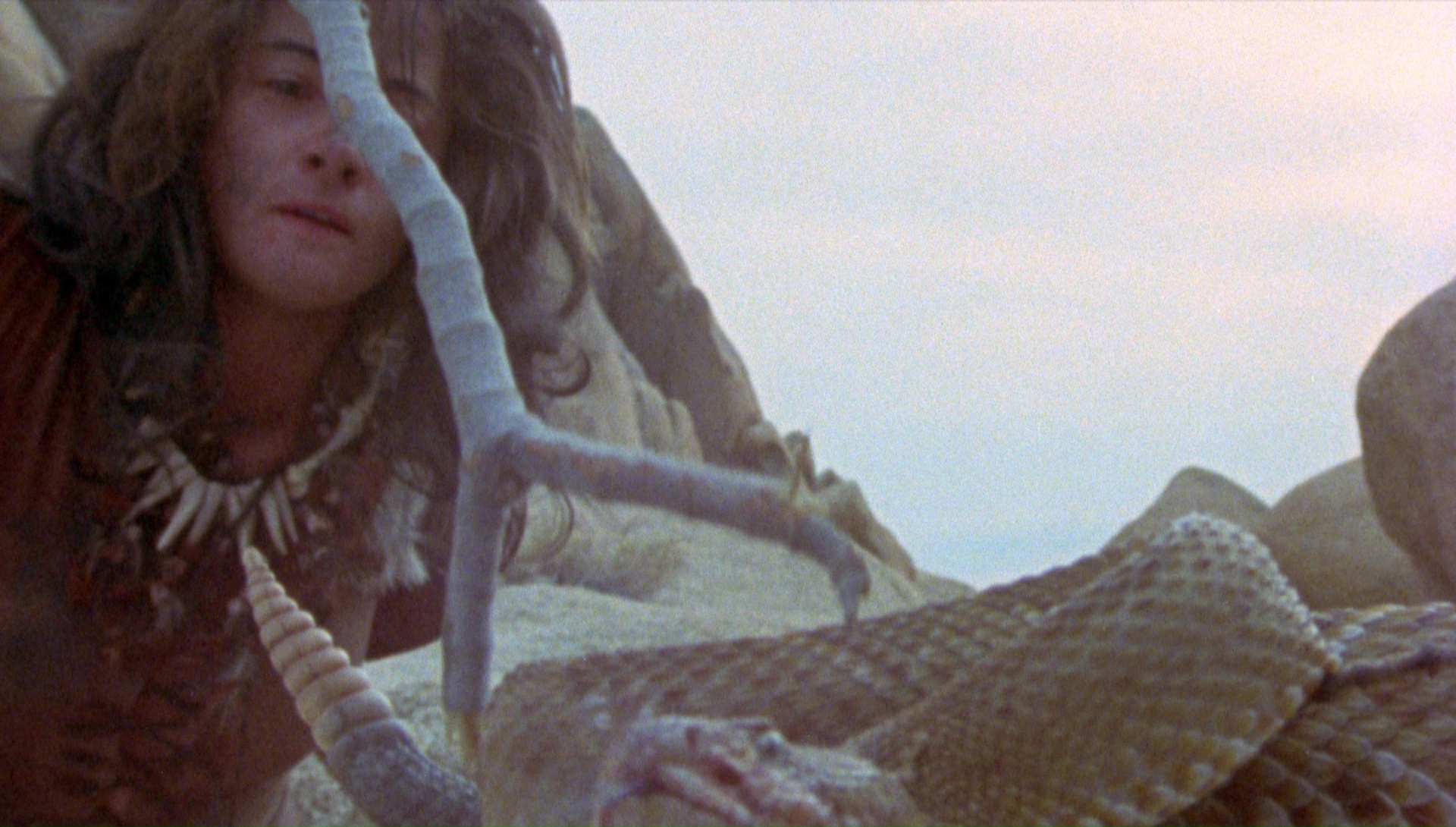 savage battle for survival ensues with both families fighting tooth and nail to make it till morning.
savage battle for survival ensues with both families fighting tooth and nail to make it till morning.
For this film, Craven joined forces with producer Peter Locke, with whom he’d worked on a handful of (really good) adult titles like Angela the Fireworks Woman and It Happened in Hollywood. The decision to shoot in the real California desert turned the 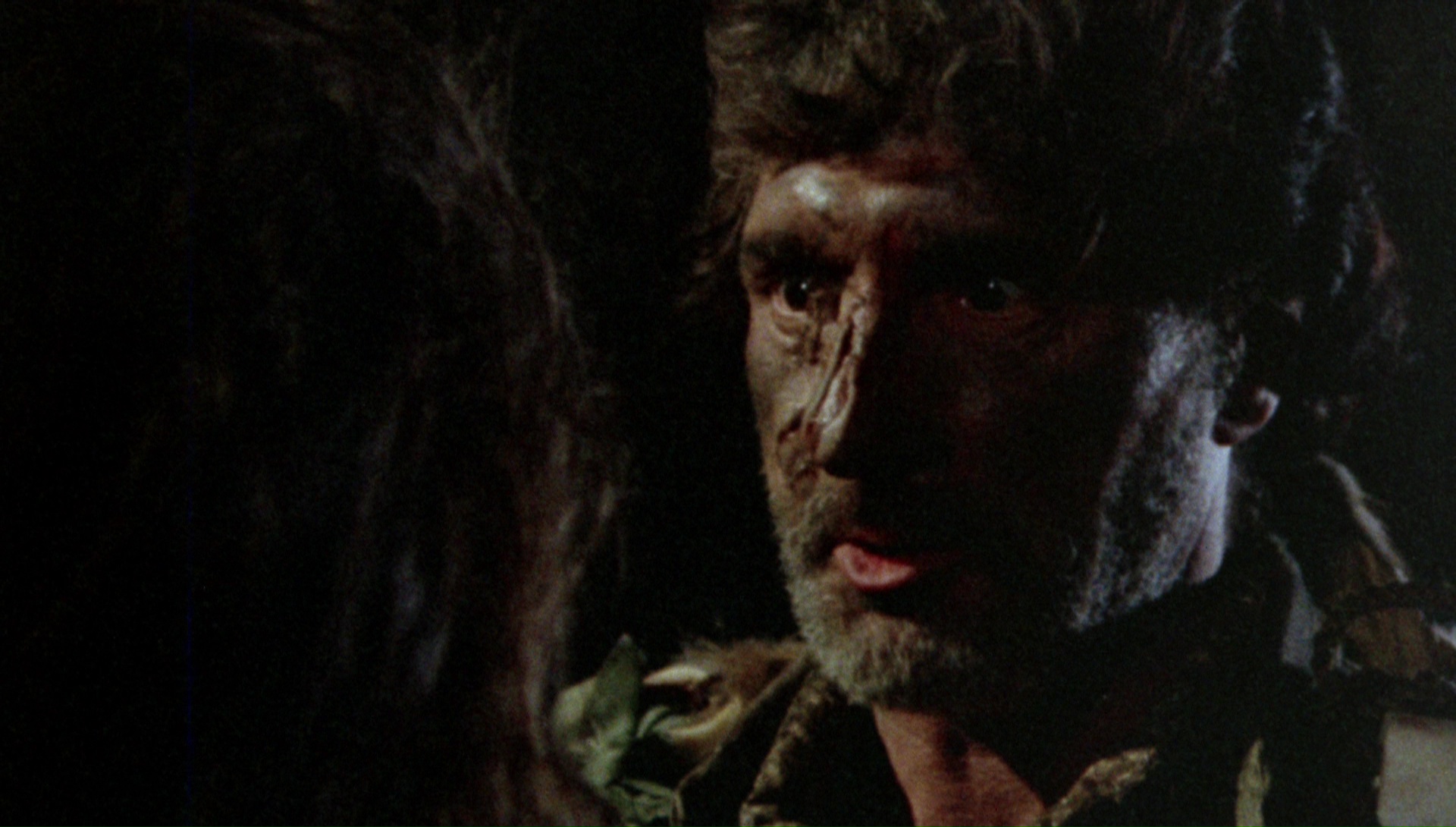 production into something of an ordeal with violent temperature swings, but the end result is an undeniably effective nail biter that creates a brutal, unsparing atmosphere while actually showing far less than you’d imagine (a la its closest inspiration, The Texas Chainsaw Massacre). Craven’s fondness for dark humor and booby traps is well in evidence here, too, with the climax sporting some clever bits of mayhem designed to have audiences cheering. Dog lovers will also get a kick out of seeing one of the family’s two pets avenge its mate in a scene that stopped drive-in viewers in their tracks, and ever the provocateur, Craven even gets close to offering a very grim fate to the little baby in the Carter family (which was apparently going to be realized at one point before the cast and crew balked). The actors are all believable despite some highly questionable wardrobe choices, with Berryman obviously swiping all of his scenes and future E.T. mom Wallace already showing off some fine acting chops here. Composer Don Peake (who later returned to Craven terrain with The People under the Stairs) supplies a nerve-jangling score that’s become something of a cult favorite in its own right, too. Weirdly, despite its success the film didn’t immediately launch Craven on to the Hollywood big time; he went on to do the Linda Blair made-for-TV horror film Summer of Fear the following year and then laid low until the compromised but highly effective rural horrors of Deadly Blessing in 1981.
production into something of an ordeal with violent temperature swings, but the end result is an undeniably effective nail biter that creates a brutal, unsparing atmosphere while actually showing far less than you’d imagine (a la its closest inspiration, The Texas Chainsaw Massacre). Craven’s fondness for dark humor and booby traps is well in evidence here, too, with the climax sporting some clever bits of mayhem designed to have audiences cheering. Dog lovers will also get a kick out of seeing one of the family’s two pets avenge its mate in a scene that stopped drive-in viewers in their tracks, and ever the provocateur, Craven even gets close to offering a very grim fate to the little baby in the Carter family (which was apparently going to be realized at one point before the cast and crew balked). The actors are all believable despite some highly questionable wardrobe choices, with Berryman obviously swiping all of his scenes and future E.T. mom Wallace already showing off some fine acting chops here. Composer Don Peake (who later returned to Craven terrain with The People under the Stairs) supplies a nerve-jangling score that’s become something of a cult favorite in its own right, too. Weirdly, despite its success the film didn’t immediately launch Craven on to the Hollywood big time; he went on to do the Linda Blair made-for-TV horror film Summer of Fear the following year and then laid low until the compromised but highly effective rural horrors of Deadly Blessing in 1981.
The first DVD release of the film  came from Anchor Bay in 2003 in a nicely appointed two-disc special edition featuring a happier alternate ending (more thematically consistent but less memorable), an audio commentary with Craven and Locke, a 54-minute "Looking Back on The Hills Have Eyes" documentary (with Craven, Locke, Berryman, Houston, Lanier, Wallace, and director of photography Eric Saarinen), the Craven episode of the often circulated video series The Directors, U.S. and German theatrical trailers, U.S. and U.K. TV spots, three galleries (behind-the-scenes, posters and advertising art, and storyboards), a Craven bio, a liner notes booklet, and a PDF of the script with DVD-Rom screensavers (remember those?). The featurette and commentary are especially interesting
came from Anchor Bay in 2003 in a nicely appointed two-disc special edition featuring a happier alternate ending (more thematically consistent but less memorable), an audio commentary with Craven and Locke, a 54-minute "Looking Back on The Hills Have Eyes" documentary (with Craven, Locke, Berryman, Houston, Lanier, Wallace, and director of photography Eric Saarinen), the Craven episode of the often circulated video series The Directors, U.S. and German theatrical trailers, U.S. and U.K. TV spots, three galleries (behind-the-scenes, posters and advertising art, and storyboards), a Craven bio, a liner notes booklet, and a PDF of the script with DVD-Rom screensavers (remember those?). The featurette and commentary are especially interesting 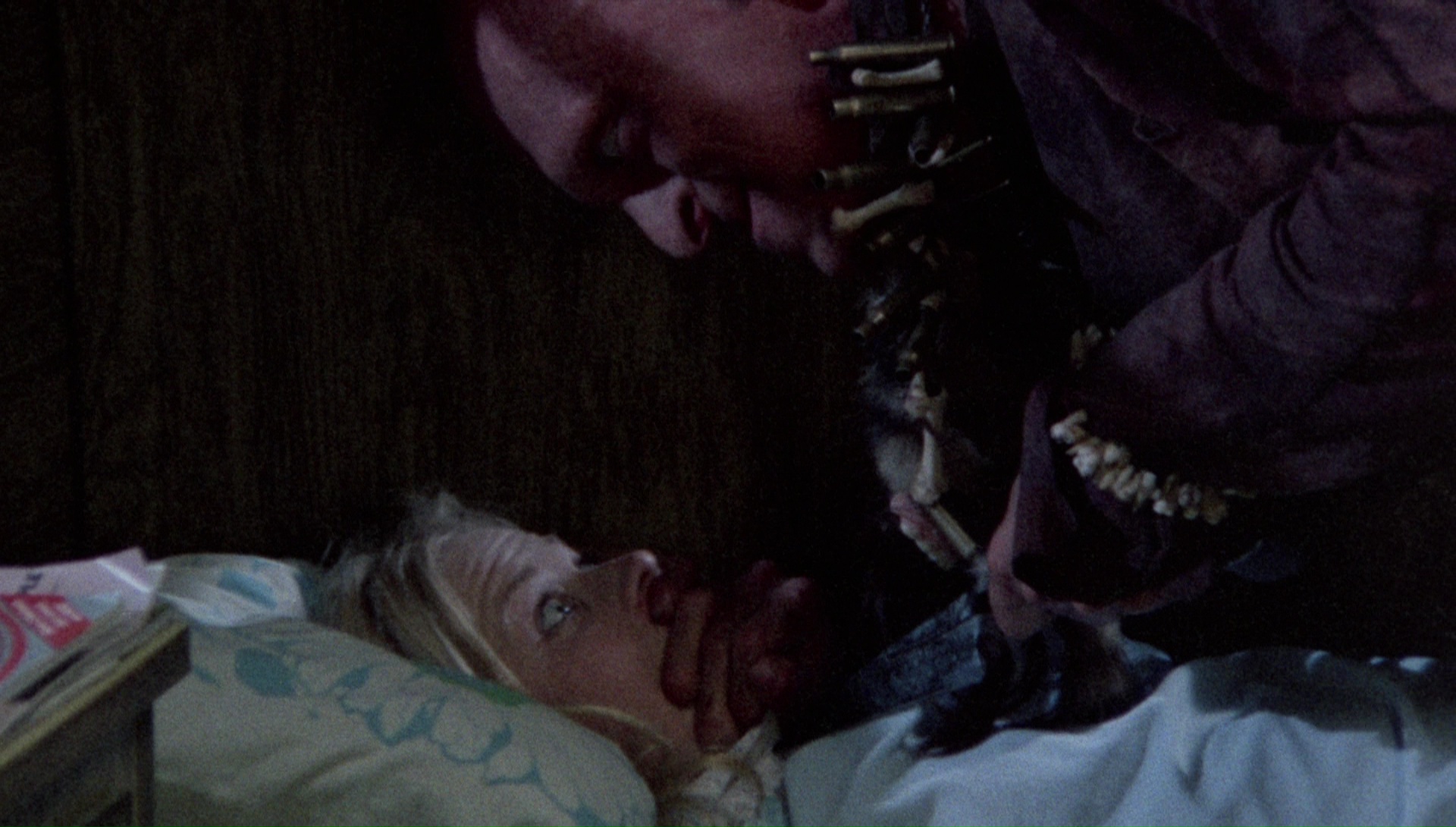 as they cover the film's origins in the (presumably mythical or exaggerated) exploits of Scottish cannibal clan leader Sawney Bean, the problems encountered with the MPAA (resulting in some brief trims that have sadly been lost), Craven's background as a teacher, the casting process (who could cry or run the best), and the arduous and "primitive" shooting conditions, among many other topics. The same package was essentially ported over by Image Entertainment as part of its short-lived Midnight Madness Series (which also incorporated several New World ‘80s titles and Re-Animator), but the transfer looked like an awkward upconversion of the same master as the Anchor Bay disc (but with its softness and compression flaws magnified tenfold). A UK disc from Anchor Bay included the same package but also added the Adam Simon documentary, The American Nightmare.
as they cover the film's origins in the (presumably mythical or exaggerated) exploits of Scottish cannibal clan leader Sawney Bean, the problems encountered with the MPAA (resulting in some brief trims that have sadly been lost), Craven's background as a teacher, the casting process (who could cry or run the best), and the arduous and "primitive" shooting conditions, among many other topics. The same package was essentially ported over by Image Entertainment as part of its short-lived Midnight Madness Series (which also incorporated several New World ‘80s titles and Re-Animator), but the transfer looked like an awkward upconversion of the same master as the Anchor Bay disc (but with its softness and compression flaws magnified tenfold). A UK disc from Anchor Bay included the same package but also added the Adam Simon documentary, The American Nightmare.
Anyone pining for a worthy transfer of this film will find their prayers answered with the 2016 edition from Arrow Video, issued as a Blu-ray in the U.S. and separate Blu-ray and DVD editions in the U.K. Touted as a "brand new 4K restoration from original film elements" supervised by Locke, it dispenses with the gimmicky 7.1 remix from the earlier editions and goes back to the original, superior mono English mix (with optional English subtitles). The image quality is such a tremendous improvement in every possible way it's astonishing; there's far more image information in the frame, the compositions are more coherent and well judged (here's one of the worst offenders from the older transfer for comparison), colors are more natural with greater range and actual flesh tones, the night scenes are more clear and impressive... well, you get the idea. The only minor issues are some intermittent fading visible on the far right side in some of the darkest shots (most obviously the opening credits and the infamous baby scene) and a reel in the middle where the color looks less saturated than the rest of the film, but that's easy to overlook considering how superior this is in every way over anything we've had before. Interestingly, the alternate ending is included here both as a standalone extra and as an option to be played with the main feature, which runs 91 minutes 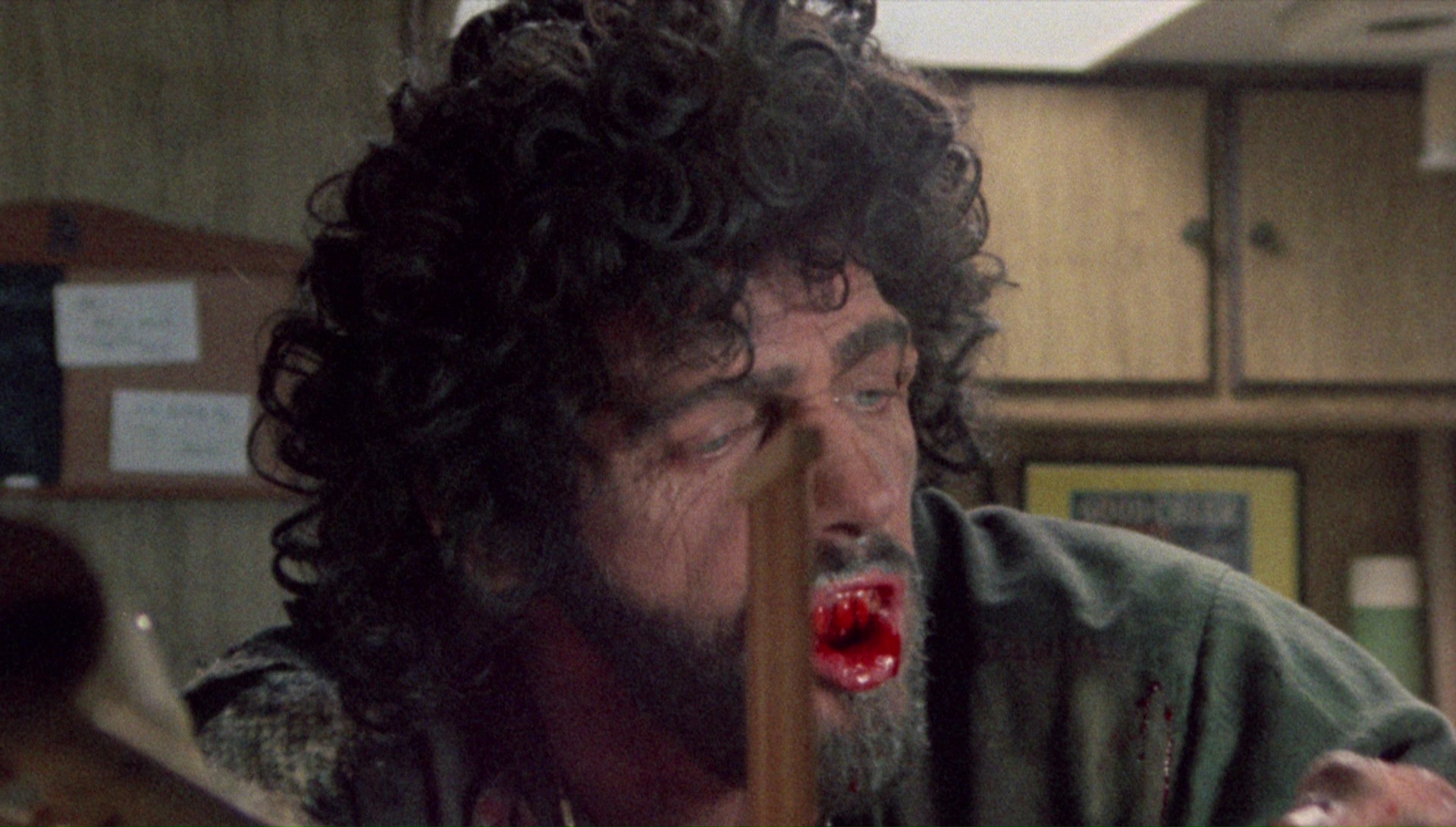 with its inclusion. It's interesting to watch the whole film through this way as it switches around the two main chains of action during the climax, and the effect of the happier closing shots and very different closing credits leaves you with a significantly altered experience. The alternate ending is also presented in dramatically improved condition compared to the ragged full frame version seen on the past releases.
with its inclusion. It's interesting to watch the whole film through this way as it switches around the two main chains of action during the climax, and the effect of the happier closing shots and very different closing credits leaves you with a significantly altered experience. The alternate ending is also presented in dramatically improved condition compared to the ragged full frame version seen on the past releases. 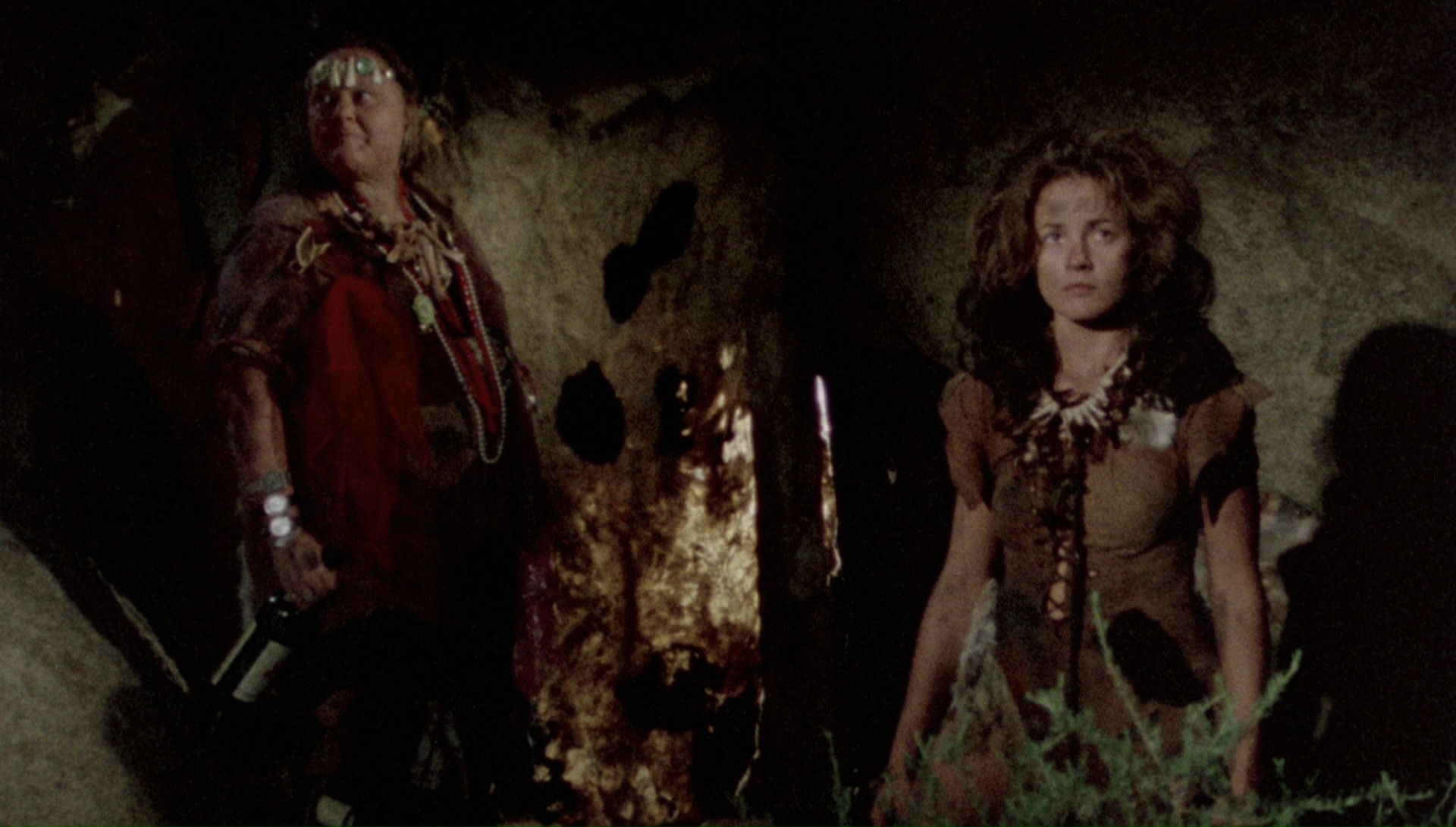
The Craven/Locke commentary, "Looking Back" featurette, PDF screenplay, and trailers and TV spots are carried over here, but there's a ton of new material as well. A great new audio commentary moderated by Red Shirt Pictures' Michael Felsher brings together Speer, Lanier, Blythe, and Berryman, all of whom sound in a great mood as they remember their early acting days and the ways they plunged into this physically demanding project. It's only scene specific on a few occasions, coming off instead more like a lively panel discussion that runs over the course of the film. The late Craven is spoken of at length with lots of stories about his adapting to the demands of the location, and don't miss the rattlesnake stories! Another new audio commentary with film scholar Mikel J. Koven dispenses with any production info or trivia, going instead for a film lecture approach as he talks at length about the Sawney Bean legend and the American folklore aspects of the film as an examination of family units, feral behavior, and other tangential topics like Ed Gein and Homer's The Odyssey. A new video interview with Speer, "Family Business" (16 mins.), plays like a nice companion piece to the old "Looking Back" piece (from which he was absent) as he goes into more detail about his first audition reading, the joys of making out on camera with Dee Wallace, and coping with such extreme temperature swings from day to night. In "The Desert Sessions" (11 mins.), Peake chats about coming up with the unnerving, string-driven score for the film -- this "ugly music!" -- adjacent to some of the era's biggest music legends in the studio, complete with some great stories about the instrumental and recording experimentation required to get the right sound. Fans should especially enjoy 19 minutes of unreleased outtakes, which start off by verifying that claim about making out with Wallace (who keeps banging her head) and feature an abbreviation of the original shooting title of Blood Relations on the slate. There's nothing shocking or revelatory here, but it's a lot of fun to see the actors flubbing lines, especially when it's Berryman and Gordon hauling around a fake baby or the dog trainer at work. An new HD gallery of posters and lobby cards rounds out the disc itself, which comes packaged with six postcards, the usual reversible cover art options, and a booklet with liner notes by Brad Stevens and Ewan Cant. Essential viewing.
Reviewed on September 14, 2016.






 After creating a notorious cinematic calling card with his debut feature, Last House on the Left, Wes Craven took five years to unleash a second horror film: The Hills Have Eyes. Though relatively savage and violent enough at the time to earn an X rating, the film was obviously geared to a more traditional drive-in audience with its thrills tied to an outlandish clan of inbred desert dwellers named after figures from Roman mythology instead of the all-too-real sexual predators and sadists from his first film. Now considered a classic of ‘70s horror, The Hills Have Eyes has been slavishly imitated over the years, even inspiring a direct sequel helmed (and famously disowned) by Craven as well as a 2006 remake with its own sequel to boot.
After creating a notorious cinematic calling card with his debut feature, Last House on the Left, Wes Craven took five years to unleash a second horror film: The Hills Have Eyes. Though relatively savage and violent enough at the time to earn an X rating, the film was obviously geared to a more traditional drive-in audience with its thrills tied to an outlandish clan of inbred desert dwellers named after figures from Roman mythology instead of the all-too-real sexual predators and sadists from his first film. Now considered a classic of ‘70s horror, The Hills Have Eyes has been slavishly imitated over the years, even inspiring a direct sequel helmed (and famously disowned) by Craven as well as a 2006 remake with its own sequel to boot. savage battle for survival ensues with both families fighting tooth and nail to make it till morning.
savage battle for survival ensues with both families fighting tooth and nail to make it till morning. production into something of an ordeal with violent temperature swings, but the end result is an undeniably effective nail biter that creates a brutal, unsparing atmosphere while actually showing far less than you’d imagine (a la its closest inspiration, The Texas Chainsaw Massacre). Craven’s fondness for dark humor and booby traps is well in evidence here, too, with the climax sporting some clever bits of mayhem designed to have audiences cheering. Dog lovers will also get a kick out of seeing one of the family’s two pets avenge its mate in a scene that stopped drive-in viewers in their tracks, and ever the provocateur, Craven even gets close to offering a very grim fate to the little baby in the Carter family (which was apparently going to be realized at one point before the cast and crew balked). The actors are all believable despite some highly questionable wardrobe choices, with Berryman obviously swiping all of his scenes and future E.T. mom Wallace already showing off some fine acting chops here. Composer Don Peake (who later returned to Craven terrain with The People under the Stairs) supplies a nerve-jangling score that’s become something of a cult favorite in its own right, too. Weirdly, despite its success the film didn’t immediately launch Craven on to the Hollywood big time; he went on to do the Linda Blair made-for-TV horror film Summer of Fear the following year and then laid low until the compromised but highly effective rural horrors of Deadly Blessing in 1981.
production into something of an ordeal with violent temperature swings, but the end result is an undeniably effective nail biter that creates a brutal, unsparing atmosphere while actually showing far less than you’d imagine (a la its closest inspiration, The Texas Chainsaw Massacre). Craven’s fondness for dark humor and booby traps is well in evidence here, too, with the climax sporting some clever bits of mayhem designed to have audiences cheering. Dog lovers will also get a kick out of seeing one of the family’s two pets avenge its mate in a scene that stopped drive-in viewers in their tracks, and ever the provocateur, Craven even gets close to offering a very grim fate to the little baby in the Carter family (which was apparently going to be realized at one point before the cast and crew balked). The actors are all believable despite some highly questionable wardrobe choices, with Berryman obviously swiping all of his scenes and future E.T. mom Wallace already showing off some fine acting chops here. Composer Don Peake (who later returned to Craven terrain with The People under the Stairs) supplies a nerve-jangling score that’s become something of a cult favorite in its own right, too. Weirdly, despite its success the film didn’t immediately launch Craven on to the Hollywood big time; he went on to do the Linda Blair made-for-TV horror film Summer of Fear the following year and then laid low until the compromised but highly effective rural horrors of Deadly Blessing in 1981.  came from Anchor Bay in 2003 in a nicely appointed two-disc special edition featuring a happier alternate ending (more thematically consistent but less memorable), an audio commentary with Craven and Locke, a 54-minute "Looking Back on The Hills Have Eyes" documentary (with Craven, Locke, Berryman, Houston, Lanier, Wallace, and director of photography Eric Saarinen), the Craven episode of the often circulated video series The Directors, U.S. and German theatrical trailers, U.S. and U.K. TV spots, three galleries (behind-the-scenes, posters and advertising art, and storyboards), a Craven bio, a liner notes booklet, and a PDF of the script with DVD-Rom screensavers (remember those?). The featurette and commentary are especially interesting
came from Anchor Bay in 2003 in a nicely appointed two-disc special edition featuring a happier alternate ending (more thematically consistent but less memorable), an audio commentary with Craven and Locke, a 54-minute "Looking Back on The Hills Have Eyes" documentary (with Craven, Locke, Berryman, Houston, Lanier, Wallace, and director of photography Eric Saarinen), the Craven episode of the often circulated video series The Directors, U.S. and German theatrical trailers, U.S. and U.K. TV spots, three galleries (behind-the-scenes, posters and advertising art, and storyboards), a Craven bio, a liner notes booklet, and a PDF of the script with DVD-Rom screensavers (remember those?). The featurette and commentary are especially interesting  as they cover the film's origins in the (presumably mythical or exaggerated) exploits of Scottish cannibal clan leader Sawney Bean, the problems encountered with the MPAA (resulting in some brief trims that have sadly been lost), Craven's background as a teacher, the casting process (who could cry or run the best), and the arduous and "primitive" shooting conditions, among many other topics. The same package was essentially ported over by Image Entertainment as part of its short-lived Midnight Madness Series (which also incorporated several New World ‘80s titles and Re-Animator), but the transfer looked like an awkward upconversion of the same master as the Anchor Bay disc (but with its softness and compression flaws magnified tenfold). A UK disc from Anchor Bay included the same package but also added the Adam Simon documentary, The American Nightmare.
as they cover the film's origins in the (presumably mythical or exaggerated) exploits of Scottish cannibal clan leader Sawney Bean, the problems encountered with the MPAA (resulting in some brief trims that have sadly been lost), Craven's background as a teacher, the casting process (who could cry or run the best), and the arduous and "primitive" shooting conditions, among many other topics. The same package was essentially ported over by Image Entertainment as part of its short-lived Midnight Madness Series (which also incorporated several New World ‘80s titles and Re-Animator), but the transfer looked like an awkward upconversion of the same master as the Anchor Bay disc (but with its softness and compression flaws magnified tenfold). A UK disc from Anchor Bay included the same package but also added the Adam Simon documentary, The American Nightmare. with its inclusion. It's interesting to watch the whole film through this way as it switches around the two main chains of action during the climax, and the effect of the happier closing shots and very different closing credits leaves you with a significantly altered experience. The alternate ending is also presented in dramatically improved condition compared to the ragged full frame version seen on the past releases.
with its inclusion. It's interesting to watch the whole film through this way as it switches around the two main chains of action during the climax, and the effect of the happier closing shots and very different closing credits leaves you with a significantly altered experience. The alternate ending is also presented in dramatically improved condition compared to the ragged full frame version seen on the past releases. 
![]()